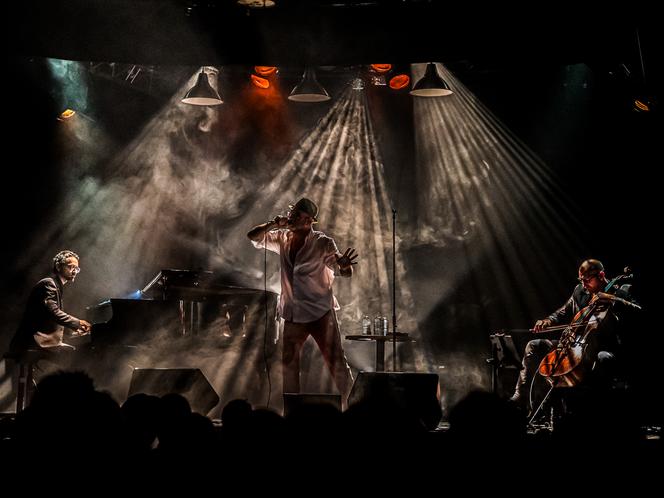


On the poster, in a light sepia tint, he is wearing a beanie, a checked shirt and his head is raised. In yellow capital letters, it reads "Cantona Sings Eric." A former striker for Auxerre, Marseille (the town where he was born in 1966), Leeds and Manchester United, Eric Cantona retired from football in 1997. He pursued his artistic ambitions as early as 1988, first as a painter, then as a photographer and an actor in film (first appearing in 1995 in Etienne Chatiliez's Le bonheur est dans le pré [Happiness is in the Field]), on television and on stage.
And now he is a singer on a short, 13-concert autumn tour, which began at Manchester's Stoller Hall on October 26 and ending with three dates at Paris's Théâtre de l'Atelier. A follow-up tour is scheduled for spring 2024. On Tuesday, November 14, Cantona sang Eric in the first of three shows at the Montmartre venue. Most of the songs were written and composed by Cantona, mostly in English, with a few in French, and one in Spanish.
Often described as a loudmouth ("I Arrived/Called by the press/The brat/The craziest," he writes in "I Love You So Much"), Cantona could have hired a rowdy rock band to play alongside him. But it would have been too obvious. Instead, he has opted for an acoustic set, with pianist Julien Perraudeau and cellist Jeff Assy (the latter sometimes using loops as bass sounds). He took the risk of putting his voice in the foreground – a voice that is deep, poised and expressive. At times, the vocals veer toward the spoken word, and take on a softer tone when Cantona sings in French.
He may have spent several years in England, but Cantona has retained a distinctly French accent, with an assertive "ze" every time he says "the". Yet he embraces it, and it soon sounds familiar. At the start of the concert, he stood in front of the microphone with his massive build clad in a long black coat. Shortly after, he took it off, revealing a white shirt and red sweatpants. And he left his somewhat solemn posture: Microphone in his right hand, he brought his lyrics to life with gestures that accompany the melodies. His left arm rose, his shoulders rolled, he bent over, raised his chest, looked towards the ceiling, pointed, his hand drawing shapes, visually underlining words. There was a mixture of grace and energy in him, ready to leap. It's all about love, feelings and emotions expressed in the first person.
Musically, he mostly delved into the ballad genre ("I'll Make My Own Heaven," "I'm Just an Unknown Lover," "Of the Sun," "The Friends We Lost," "J'avance et je rêve," composed by Rodolphe Burger), but there were a few more rhythmic moments, including a trip to South America ("Mi amor") and a cabaret number ("I Want to See You"). The piano and cello gave shape to the piec atmospheres, sometimes dreamy, sometimes more marked ones.
You have 20% of this article left to read. The rest is for subscribers only.
